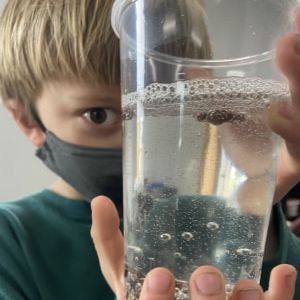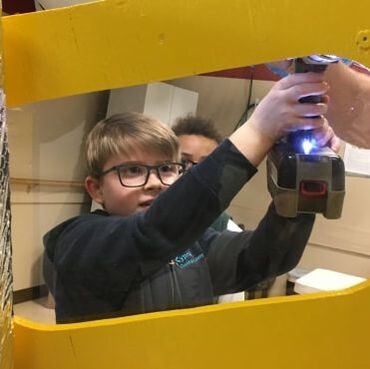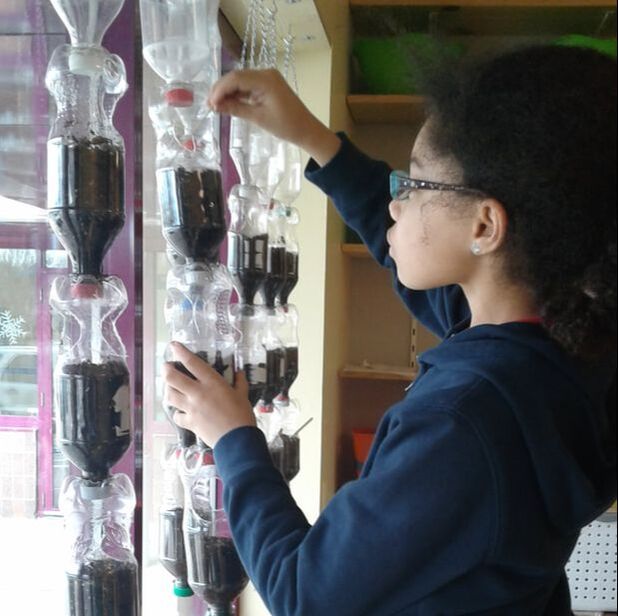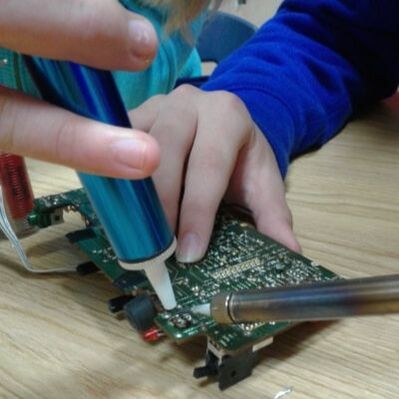Cyprus Classical Academy Science
Comprehensive, Innovative, and Globally Aware
Beginning ScienceCyprus Classical Academy's youngest scientists enjoy a fun, experimental, and observation-based hands-on science class that exposes them to many branches of science including Physical Science, Chemistry, Life Science, Earth Science, Environmental Science, and Technology. Students work individually and in groups on experiments and projects to make and record observations which facilitates an understanding of a wide variety of scientific concepts. Teachers guide their students into the habit of scientific thinking by naturally incorporating the steps of the scientific method from the earliest ages. |
Young ScientistsCyprus Academy uses an approach of scientific inquiry, allowing our Young Scientists to utilize their scientific thinking skills. We use a comprehensive and progressive program that uses the scientific method while incorporating advanced and accurate scientific terminology. Students learn concepts through direct instruction and expand their knowledge with hands-on projects, experimentation, and research. Students are encouraged to participate in our school's science fair. |
Intermediate ScienceUpper elementary students learn to extract valuable information from textbooks using a middle school curriculum. Students refine their science skills through science labs, and begin to learn to write basic lab reports. This level offers a revolving curriculum over three years of Biology, Physics, and Chemistry, with integrated studies of environmental and computer science. Students continue to develop their understanding of the scientific method and are now expected to apply it in their individual and group experimentation. Our curriculum engages students through active investigation. The instructional design begins with an introductory hands-on investigation, followed by reading, applied investigations, and opportunities to extend learning. Students begin taking tests based on information from textbooks and writing basic lab reports. |
Advanced ScienceStudents at this level apply their reasoning skills by answering questions through experimental design. Students develop a deep and refined understanding of experimentation by creating plans, thinking through the variables, and discussing validity. They are able to use advanced math and logic skills in their detailed lab reports, which helps to refine their understanding of the scientific method. Over three years students focus on the following: Chemistry Students learn chemistry through investigations including many demonstrations, labs and activities that make chemistry concepts easily accessible. Students study measurement, matter, chemical and nuclear reactions, thermodynamics and kinetics, and the various forms of matter. Students are required to memorize and understand the periodic table, and learn the basics of balancing equations. Biology and Neuroscience Students learn about biology and neuroscience through integrated lessons on the anatomy of the brain and intelligence. They learn about the systems of the human body through their textbook and labs. They conduct scientific investigations with creative experimentation, integration of high level mathematical formulas and statistics, understanding control groups versus controlled variables, and writing of high-level, detailed lab reports. Students continue learning about the history of science with the breakthroughs that were made with concepts understood through Newtonian principles. Physics Students begin with scientific investigations using mathematics and Newtonian physics. Students then learn about modern discoveries in science including Einstein's theories. They transition into learning about the breakthroughs that came with quantum physics to gain an understanding of its use in modern technology and science. Students are required to complete high-level, detailed lab reports, research papers, and conduct experiments that come from questions about scientific theories and ideas they have learned about. Environmental Studies Students learn about how human actions have affected our environment and ways others, including many children and teens have used innovation, intelligence, and passion, to become part of the solution. Students develop an understanding that they can be the agents of change at any age if they are inspired to do so. Students use what they have learned over the years to create an original idea or plan showing how they can be part of the solution. |
|
At Cyprus, Students attend hours of ability-based science classes each week from Super K through the Bridge Program. The progression through science is an intentional, goal oriented plan to ensure that students are high-level scientific and critical thinkers and are able to excel in science as a Cyprus student and beyond. Beginning in the fall of 2020, our curriculum has been revised to reflect the growing importance of environmental awareness and responsibility as well as the requirement of a strong foundation in technology and computer science for all educated people. |
|




